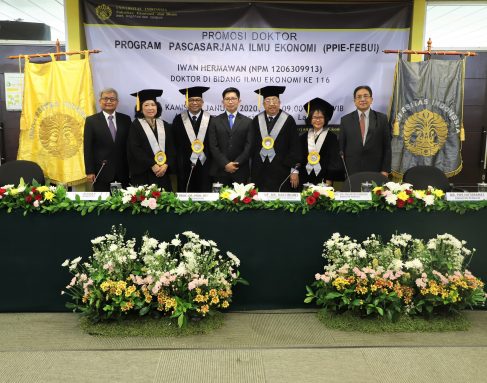Iwan Hermawan Study of the Impact of ASEAN Trade Liberalization on Rice Resilience in Indonesia
Nino Eka Putra ~ Humas FEB UI
DEPOK – Postgraduate Program in Economics, Faculty of Economics and Business, University of Indonesia held an open session of Doctor Promotion Iwan Hermawan (1206309913) which took place at the Postgraduate Auditorium, Postgraduate Building, on Thursday (1/16/2020).
The Doctoral Promotion Session was chaired by Prof. Nachrowi Djalal Nachrowi, with his supervisor, Prof. Mohamad Ikhsan, Ph.D. (Promoter), Prof. Mari Elka Pangestu, Ph.D. (Co-Promoter 1), and Erwidodo, Ph.D. (Co-Promoter 2). As the testing team, Prof. Nachrowi Djalal Nachrowi, Ph.D. (Chief Examiner), Prof. Pos Hutabarat, Ph.D., Prof. Sulastri Surono, Ph.D., Teguh Dartanto, Ph.D., and Dr. Maddaremmeng A. Panennungi.
The dissertation raised by Promovendus, titled “The Impact of ASEAN Trade Liberalization on Indonesia’s Food Security: The Rice Case”. There is an irony that occurs when trade liberalization is rejected in favor of pursuing national food security for the purpose of protecting farmers. This irony is farmers are actually worse off under national food security than they are under trade liberalization.
Various concerns that have arisen were addressed with popular policies, especially the protection and raising of food prices. So why does commitment to trade liberalization seem to be a prestigious ambition only on paper. This study investigates this phenomenon as it occurs in the case of the impact of Association of Southeast Asian Nations (ASEAN) trade liberalization on Indonesian food (rice) security and on rice farmers.
We use a combined approach to solve it comprehensively. Our approach brings together the Global Trade Analysis Project (GTAP) Model, Quadratic Almost Ideal Demand System (QUAIDS) Model, Gravity Model, and Monte Carlo. These approaches rely on secondary data sourced from the GTAP database, National Socio-Economic Survey, World Bank, Food and Agriculture Organization (FAO), World Integrated Trade Solution (WITS), and other.

“The findings of our research show that the ASEAN trade liberalization would have a positive impact on Indonesian food (rice) security if compared with trade restricted policies. These positive effects would be enhanced if the open market were to be followed by actions to increase efficiency and reduce the cost of rice,” said Iwan Hermawan.
Furthermore, to see the consistency of these impacts, we scrutinize at rice farming households as net rice producers or net rice consumers. They are the nucleus of food security and evidently saw improvements in demand pattern and welfare gains when trade liberalization took place. Besides the vigorous competition that would result from trade liberalization, collaboration through regional rice stocks could help us to have greater faith in International rice markets.
“This research throws light on facts that would otherwise remain hidden in the shadows, the policies imposed by the giant force of government may have been designed to protect the little guys, but the truth is that these policies are less beneficial to farmers than trade liberalization would be,” he concluded.
Thus, the Leadership Council of the open session of doctoral promotion decided, Iwan Hermawan (1206309913) was declared to graduate with the title of Very Satisfying and succeeded in getting his 116th Doctorate in Economics. Congratulations to Dr. Iwan Hermawan! (Des)














